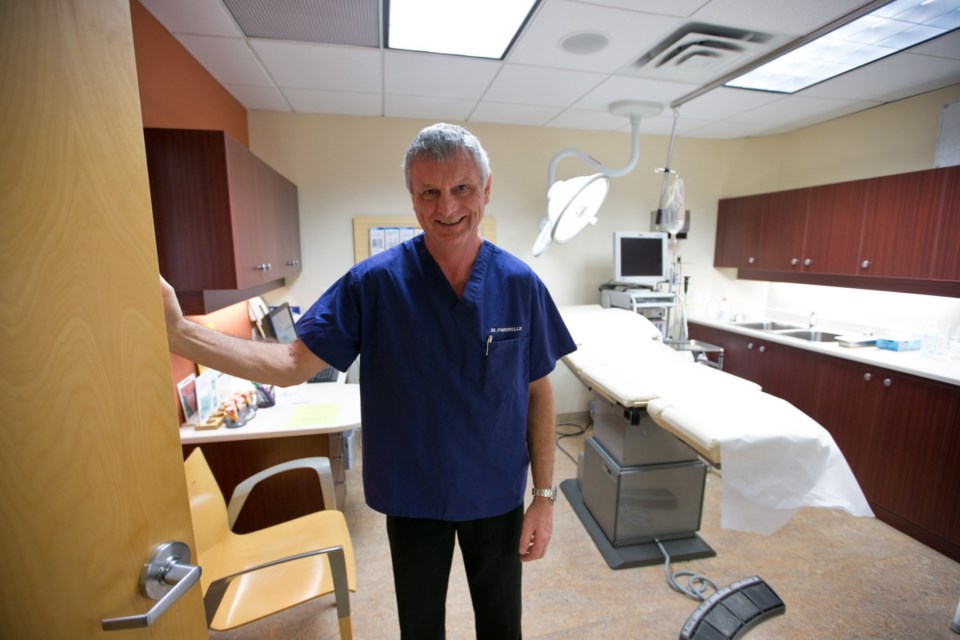Every man carries his own personal fountain of youth, says a Victoria urologist.
Dr. Peter Pommerville says the testes, the two testicles, the largest producers in a man’s body of the hormone testosterone, serve up a serum that improves muscle tone, bone density, skin condition, weight levels, hair production and healing capacity.
“When [16th-century Spanish explorer] Ponce de Leon was sailing around the world trying to find the Fountain of Youth, it was really testosterone he was looking for,” said Pommerville. “It really does help keep men young and active.”
But he said he has become frustrated recently with warnings about the dangers of testosterone replacement therapy, saying they are not well-founded.
For example, Health Canada in July posted a warning to patients and doctors, based on a review of several studies. It said replacement testosterone therapy may pose an increased risk of heart attack, stroke, blood clots and heart-rhythm irregularities.
Drugs and treatments for low testosterone, however, were not ordered removed from the pharmacies.
Pommerville has problems with many of the studies that led to these warnings. At least one, he said, examined the effects of testosterone on women, a treatment rarely prescribed.
He said the risk of blood clots is real, since testosterone will increase the production of red blood cells. It’s even used to treat dialysis patients for anemia.
The other documented risk is an increase in aggression or mood swings, especially if the levels in the body become too high.
But Pommerville said if a patient goes on testosterone replacement therapy, he and his treating physician should commit to lifelong medical monitoring. Keeping track of things such as blood counts and making sure the levels of testosterone stay within a normal range keeps the therapy safe.
For men, the benefits of testosterone replacement therapy usually outweigh the risks.
“Today, it really is a crime if you see a patient who requires testosterone replacement therapy and doesn’t get it,” he said.
Testosterone is a hormone produced mostly in the testes in men and, in smaller amounts, the ovaries in women.
The hormone is key in the development of a man’s sexual organs and their function. It is also a factor in the production of the man’s secondary sexual characteristics such as body hair and, compared to women, bigger muscles and bones.
But it also effects things such as bone density and the ability of tissue to heal, and it even assists in the treatment of diabetes.
“I like to call it the universal hormone because it effects every system in your body,” said Pommerville.
Production of testosterone peaks in the teen years and early adulthood. After about age 35, a man’s production decreases about one per cent per year.
When production of testosterone becomes too low, the result is a disease or condition known as hypogonadism. Replacing it can be done with injection. More common is topical creams so the hormone gets absorbed through the skin and avoids the peak in the testosterone levels that occur with injections,
Pommerville said the reasons for hypogonadism can include an infection or disease in the testes or a problem with the pituitary gland, which is also partly responsible for testosterone production.
Symptoms of low testosterone can include things like reduced sexual desire, erectile dysfunction and infertility. Others include low energy, poor concentration at work, reduced muscle mass, decreased bone density and increased body fat.
“A lot of these men are overweight,” said Pommerville. “They get big beer bellies, basically.”
“I can spot somebody with low testosterone just walking down the street,” he said.
Pommerville said it has been estimated about 30 per cent of men in North America have low testosterone. But he estimates less than 10 per cent of men are receiving testosterone replacement therapy.
And in many ways the benefits of testosterone for many men can be dramatic, especially for seniors. Even patients with Alzheimer’s disease can show an increase in mental test scores.
“I’ve had some patients who are quite elderly and their testosterone gets low, we replace it and they are amazed in the improvements to their quality of life and just their ability to just carry on with their daily activities,” said Pommerville.



